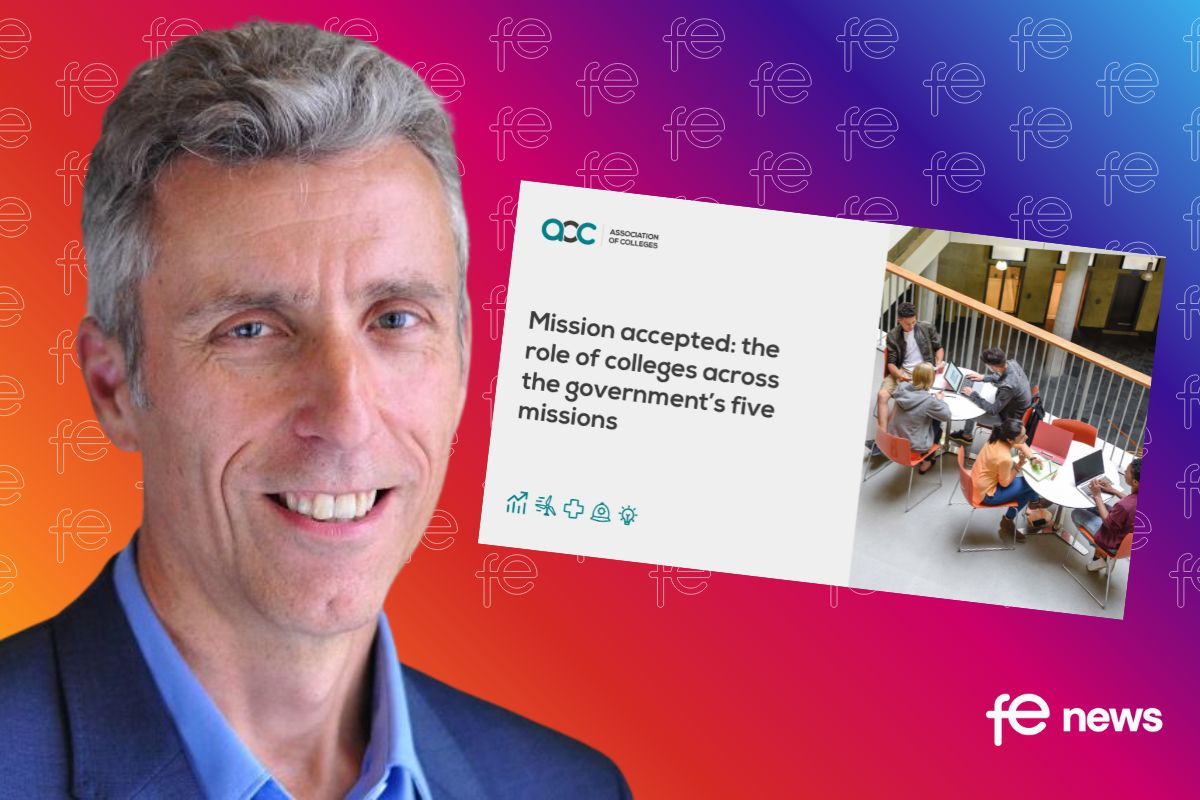AoC launch Rebuild: a skills led recovery plan – a £3.6 billion recovery plan to reduce the post-furlough skills and unemployment shock

@AoC_info release a new report : ‘Rebuild: a skills led recovery plan’
In a recession, young people and disadvantaged adults are less likely to find work, and more likely to lose their jobs, scarring them economically for the rest of their lives. We can avoid that happening this time, if we focus on getting people trained and ready for when the labour market begins to grow again.
Rapidly furloughing nine million workers was a bold but necessary move from the government, with an estimated cost of £56 billion. Government must now focus on minimising the post-furlough shock, as many fear for their jobs and their future employment prospects.The Association of Colleges is warning of:
- Increased demand for college places as high unemployment crowds young people out of the labour market
- Large numbers of young people needing support to catch up as a result of lost learning in lockdown
- Reductions in apprenticeship places, a large number of apprentice redundancies and a shortage of new places for apprentices
- Large numbers of adults requiring training to help them move from struggling sectors into those that recover more quickly, or even grow
In ‘Rebuild: a skills led recovery plan’ published today, AoC is calling on government for another bold and necessary course of action to reduce the post-furlough shock, minimise the risk of economic scarring, and prepare the country for the rebuild by:
- Guaranteeing a high quality, education or training place for every 16 to 18 year old, funded to meet their needs and the learning lost
- Offering a suite of work focused training programmes, including expanded traineeships and apprenticeships designed to get young people into jobs as soon as they become available. This should include a comprehensive bursary system and incentives for employers
- Providing support for adults who lose their jobs to train or retrain flexibly up to higher level technical / professional level, aimed at getting them back into the workforce as quickly as possible, with additional training to manage their transition once back in work.
This package would cost the Treasury £3.6 billion and deliver incentives to businesses and a flexible offer for students. Colleges are ready to deliver in every community across the country to ensure that nobody is left behind, and that we build back better through one of the best prepared future-ready work forces.
 David Hughes, Chief Executive of the Association of Colleges said:
David Hughes, Chief Executive of the Association of Colleges said:
“COVID19 and its impact on the economy is like nothing we’ve seen before, and our response has to match that. We know most that it is young people and the disadvantaged who suffer most in recessions and that this can stay with them throughout their working lives.
“Every community in the UK has a thriving college that works with hundreds of local employers to develop their workforce and anticipate their future needs. That makes colleges perfectly placed to offer education and training in what business needs and to ensure a strong pipeline of nurses and care workers, construction workers, engineers, designers and so much more.
“Government was bold with its furlough scheme, we are asking for the same in education and training. Colleges are ready to create a flexible, high quality and properly funded training and education offer, which would make sure we have the best prepared young people and adults in the world, ready to rebuild.”
 The Mayor of London, Sadiq Khan, said:
The Mayor of London, Sadiq Khan, said:
“I welcome the Association of Colleges’ call for a skills-led recovery. The wide-ranging effects of the Covid-19 pandemic mean we have to make sure the skills and employment system is able to give Londoners the education, retraining and support they need as the city starts to recover. I will continue to lobby Government for more funding for adult education and better coordination of employment and skills provision across the capital.”
 Chair of the Education Select Committee, Robert Halfon MP, has added his support to the recommendations, saying:
Chair of the Education Select Committee, Robert Halfon MP, has added his support to the recommendations, saying:
“I am passionate about ensuring that every young person gets the chance to climb the ladder of opportunity. Harlow College offers some incredible opportunities to learn and upskill and I want to see more young people take advantage of them. But the coronavirus has, understandably, left many feeling uncertain about their futures. That’s why, I strongly welcome the Association of College’s new report, calling for a guaranteed education or training place for every 16- to 18-year-old, including high-quality apprenticeships designed to get young people into the jobs they need to succeed.”
The ‘Rebuild: a skills led recovery plan’ report recommends:
Retain:
Every young person (16 to 18) has a confirmed high-quality education or training place, funded to meet their needs and the learning they have lost. Funding needs to enable in year growth and the ability for colleges to adapt to the ‘new normal’.
• A college-based national tutoring scheme, re-engagement and catch-up programme funded through a £375 premium per enrolment of students who have yet to achieve good grades in English and maths. Cost: £143m.
• A targeted one-off grant to support delayed assessments from summer 2020. Cost: £2.4m (£200 per student).
• One off grant funding for social distancing adaptations. Cost: £70m (£100 per student).
• Extending High Needs Funding for final year students.
RELAUNCH
A suite of employment related training programmes including extended traineeships, that accommodate work experience and jobs, where available, focused on levels 3, 4 and 5 for 19 to 25-year-olds who want employment to prevent long term scarring. This should be underpinned by a comprehensive bursary system and government incentives to employers.
Higher Level 3/4/5 classroom-based technician programmes for 18 and 19-year olds:
• A pre/re-employment programme to upskill and reskill targeted at key worker and recoverable sectors under a single brand to ensure employer awareness, with clear links to apprenticeship opportunities as they become available and including an interview guarantee through national employer body partners. Cost: £500m + bursary: £300m.
• Invest in high quality content from the Open University, Jisc and BLC at levels 3/4/5. Provide a range of ‘employability’ wrap around services to complement the pre/re-employment training offer including a funded information, advice and guidance (IAG) offer.
• Allow unitization / flexibility to combine adult training started out of work with transitions into short term and sustainable work without penalty for the learner or the provider.
Level 2 and 3 reformed traineeship programmes for all 16 to 24-year-olds:
• Extend maximum length to up to 12 months and allow delivery of qualifications in priority sectors up to level three.
• Allow the use of work simulation and realistic environments where access to work experience is not possible and reduce the minimum requirement of 100hrs.
• Remove existing funding cap and revise funding rates for the qualification aims and placement.
Apprenticeships for all ages:
• Block release apprenticeships with employer incentives of up to £3,000 per apprentice, with an increase of non-levy funding allocations to match.
• Where needed, a front-loaded payment profile for colleges to allow for intensive up-front delivery.
• Extend 12-week training period for redundant apprentices and apply the extension to all apprentices who lose their job due to Covid19 where there is a prospect of re-employment
RETRAIN:
A single line budget redundancy response for adults which goes up to higher level technical/professional training that allows easy transition into work, ideally with continued training.
•Bring the Adult Education Budget together in one budget line with the National Retraining Scheme, the National Skills Fund, the Shared Prosperity Fund. If properly aligned, colleges would be funded once to deliver all of them, cutting bureaucracy and making the system more understandable and accessible for colleges, employers and students.
• Urgently consider releasing a proportion of the National Skills Fund to support retraining and flexible learning at Levels 4/ 5 aimed at helping displaced adults to reskill and/or upskill in the short-term.
RESOURCE:
DfE and ESFA action to maintain capacity in the next 12 months including changing payment arrangements and bringing forward money from the £1.5bn capital fund so that it can be used on IT equipment, software and building modification in Autumn 2020.
• Single capital budget line: Bring all capital funding lines into one to allow for the much-needed investment in resources.
• Invest in online delivery and infrastructure to enable more students to be able to access high quality online learning.
• Extend and promote Taking Teaching Further Promote Further Education as an employment opportunity for those who have valuable skills which currently can’t be used in industry.
REVIEW:
A thorough review of oversight arrangements, funding rates, rules to facilitate delivery and success.
• Relaxation of the following rules will enable greater synergy in terms of employer training demands and provide a flexible approach to delivery where employers may be reluctant to release employees from the workplace to participate in training but would be keen to slot it into the working day on site where appropriate.
• These adjustments could also allow learning to continue regardless of employment status, to accommodate short bursts of employment (e.g. as offered through Job Centre), or more sustainable work opportunities;
16 to 18
• Implement rate equity for 18-year-olds on study programmes (remove the existing 17.5 percent rate reduction for these learners) as well as new programmes;
• Fund students to complete qualifications: fund students to repeat a qualification they were enrolled on in 2019/20 and were unable to complete at a cost of £2m.
• Guarantee full in-year funding for actual growth in student numbers: Streamline the process of making a case for in-year funding to reflect growth in student numbers.
Adults
• Implement rate equity for adult funding with 16 – 19 funding (not including Single Activity Matrix exceptions such as Functional Skills) and that a High Value Course Premium be implemented as per the 16-19 methodology;
• Allow those aged 19+ to take a second Level 3 qualification allowing many adults to retrain/reskill into areas where there is labour market demand;
• Funding should allow for modular learning at levels 4-5 and we ask that the funding restrictions on standalone short courses are lifted.
• That better arrangements are put in place to manage devolution to avoid the need for colleges with specialist or remote learning courses having to secure multiple contracts to serve local populations;
Apprenticeships:
• Flexibility in classroom, traineeship and apprenticeship rules to enable smooth transition from one to the other when job opportunities arise.
• Targeted employer incentives to retain and take on apprentices with a level of accountability built in.
• Revise funding profiles for front loaded apprenticeships.
• Flexibilities in the delivery of off the job training aligned to apprenticeship content but delivered outside employment.
• That alterations to the ecosystem be made to ensure that all those in potential need of training support are identified and triaged at local and/or sectoral level with the support of appropriate agencies and organisations.
• That adjustments to the rules introduced at the time the apprenticeship levy started which prevent colleges from delivering education and training programmes to adults in the workplace be made.
International
• A temporary concession should be made for international students in the 2020-21 academic year permitting colleges to self-assess student English language levels and to allow current students already in the UK to extend visas or to switch visa categories without returning to their home country.











Responses